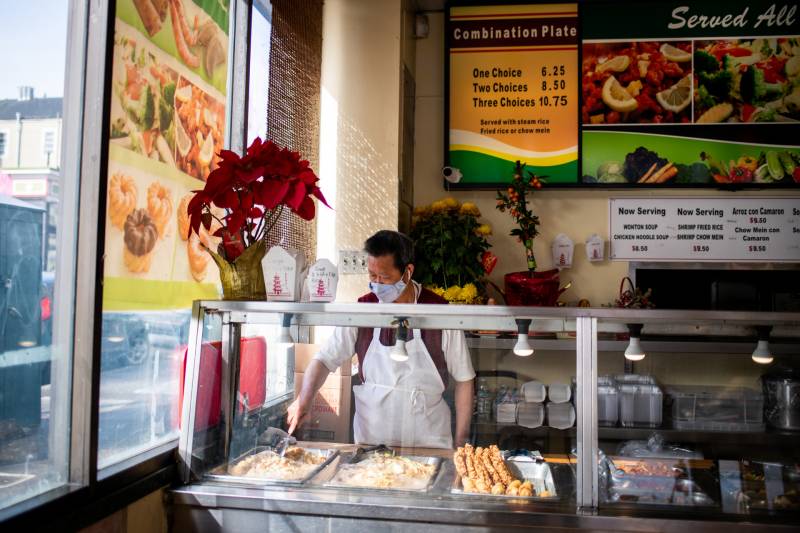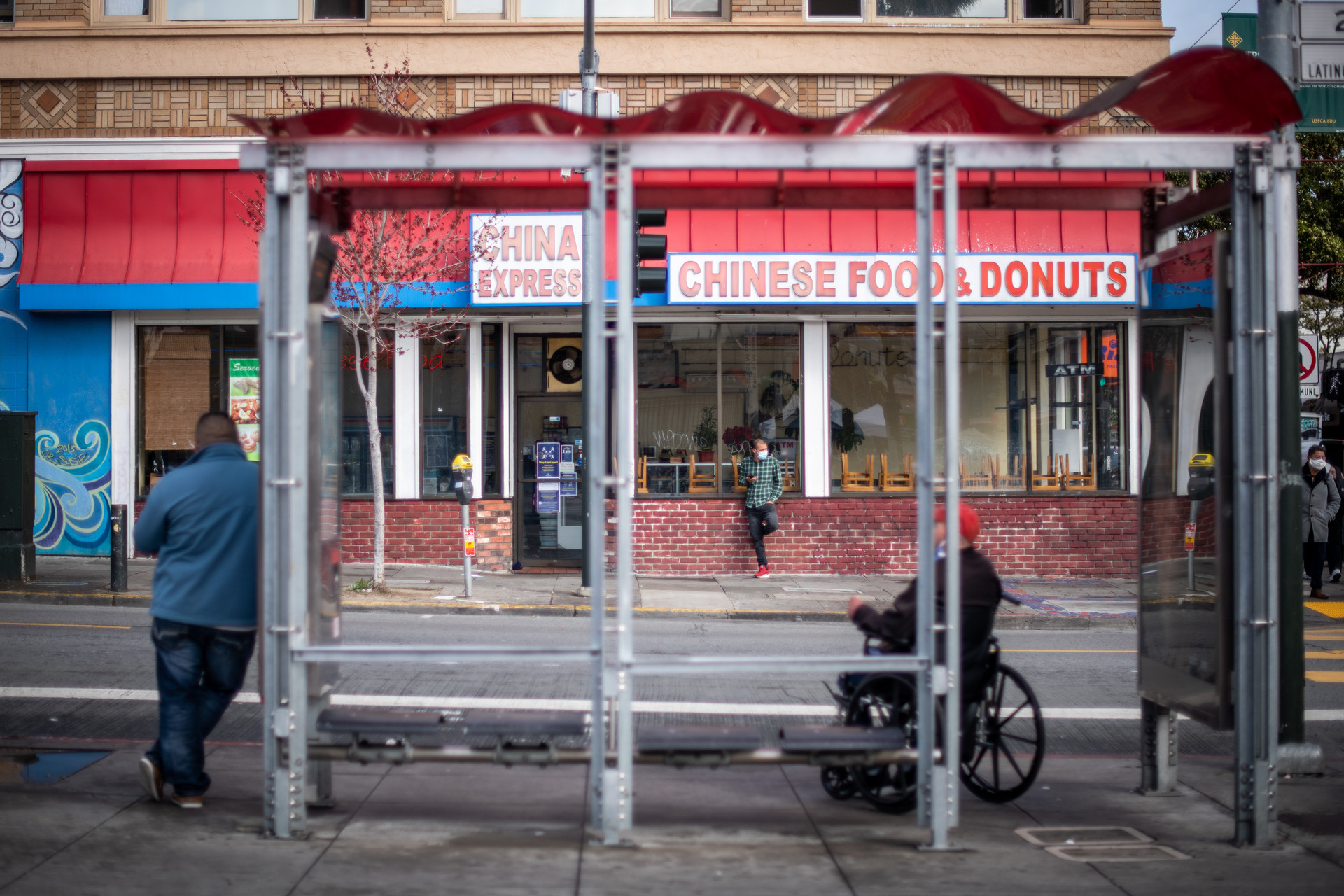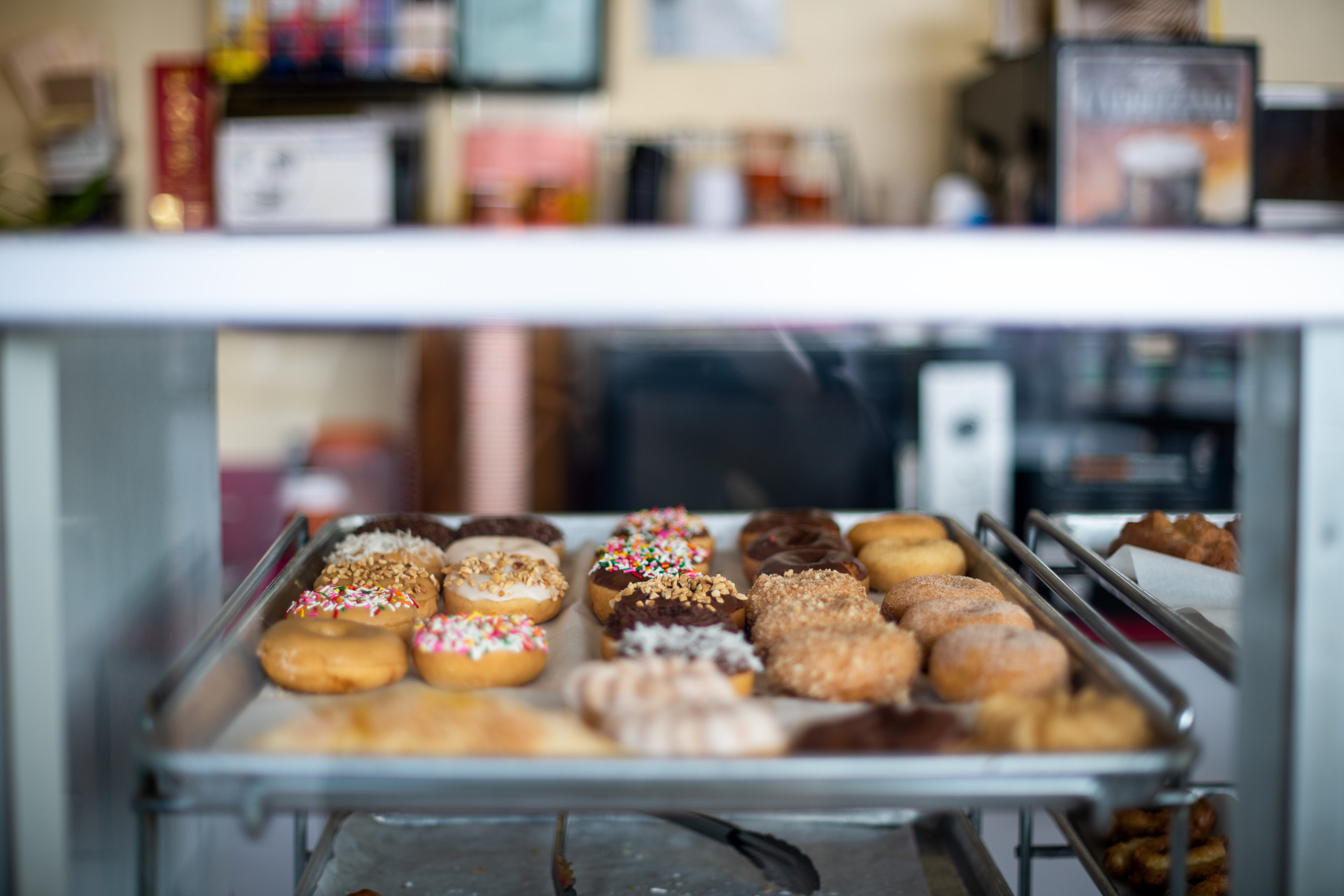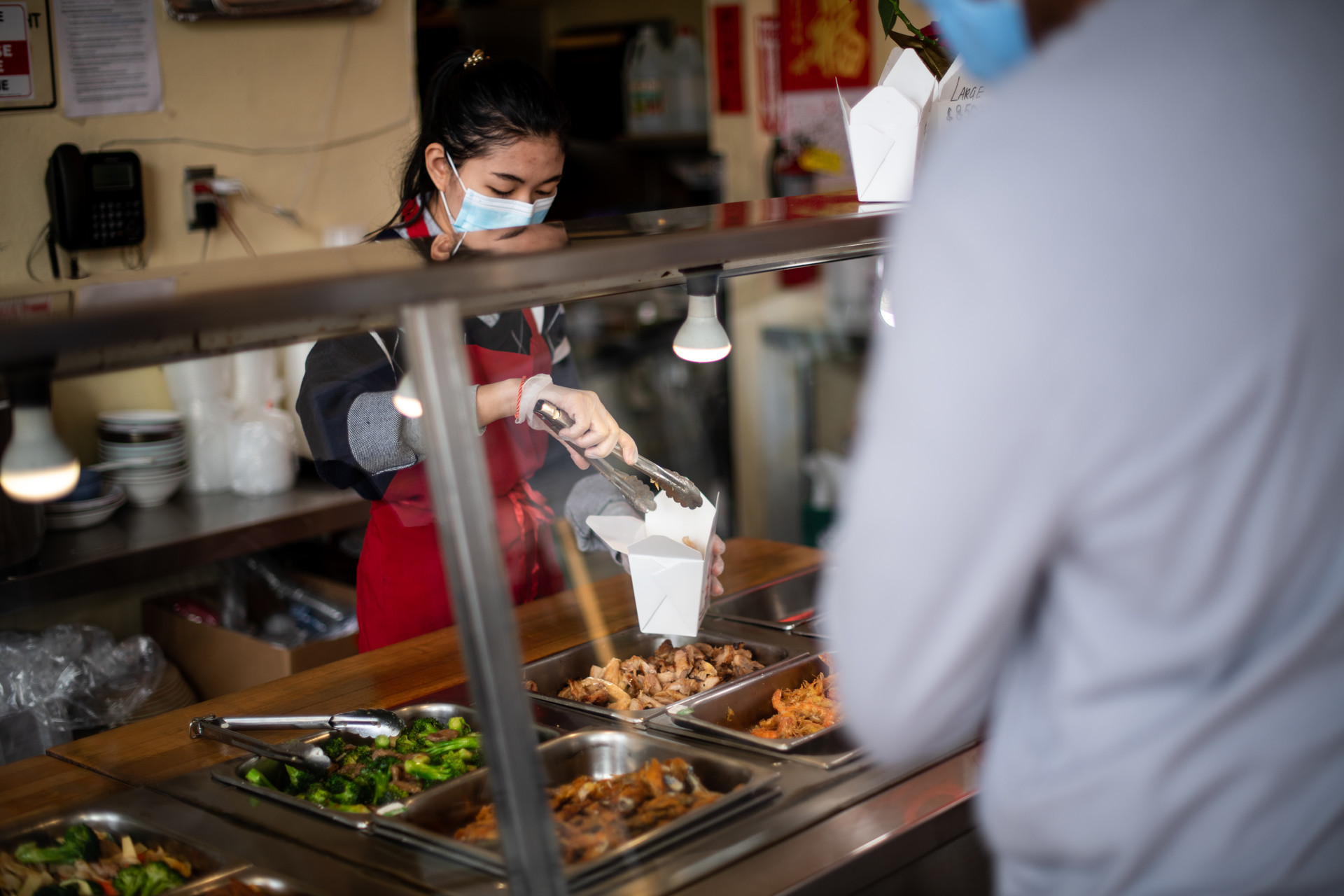Episode Transcript
Olivia Allen-Price: This is Bay Curious, the show that answers listener questions about the San Francisco Bay Area. I’m Olivia Allen-Price.
You know how most offices have a “food table?” Some communal spot where you might find extra lemons from someone’s tree … or a bag of leftover Halloween candy … or, on a lucky day, the fresh scones your baking-obsessed colleague whipped together that morning. At KQED, I can’t walk by our food table without taking a glance. You know, just in case something delicious is on offer. Nothing gets me quite as excited as when I spot a little pink cardboard box. Under the flap await a dozen golden doughnuts – just waiting to become my second breakfast.
This particular pink box is from a shop just a few blocks away in San Francisco’s Mission District that’s grabbed the attention of our question asker today, Jaime Cohen. Because they have more than donuts for sale…
Jamie Cohen: So my question is, why are there restaurants that serve Chinese food, doughnuts, and burgers all in one location?
Olivia Allen-Price:This is a winning combination Jamie has only seen in California and she wants to know why. Today on the show, we’re exploring the fascinating history and the donut king behind it all. This story first aired in 2021, but its one that still makes my mouth water. Stick around.
[[SPONSOR MESSAGE]]
Olivia Allen-Price: Reporter Asal Ehsanipour called Jamie Cohen to find out more about her obsession with donut places that also serve Chinese food.
Asal Ehsanipour: Paint me a picture. Can you remember the first time that you saw a sign that said Chinese food and doughnuts, or doughnuts and hamburgers or whatever the combination is? What were you thinking?
Jamie Cohen: So the very first time we ever–I ever noticed it, it was my husband and I. We pointed it out to each other and it said doughnuts and Chinese food and hamburgers. Why are there so many of them? And specifically in the Bay Area– what is the history of it happening here?
Asal Ehsanipour: I’ll see if I can find out.
Jamie Cohen: I want to know the history. What’s the history?
Asal Ehsanipour: OK, you got it.
Jamie Cohen: Okay, cool.
[STREET NOISE]
Asal Ehsanipour: If you’ve ever gotten off at the 24th Street / Mission BART station, you’ve probably seen the doughnut shop that first piqued Jaime’s curiosity. It’s right on the corner: “Chinese Food and Donuts” in bold red lettering.
Asal Ehsanipour: Did you eat breakfast today?
Jolly Chan: Yes. Early mornings, sometimes I feel hungry. I just grab a doughnut. [laugh]
Asal Ehsanipour: This is Jolly Chan, the owner of China Express and Donut.
Jolly Chan: I’m an immigrant from Cambodia. I came to United States in 1981 and I have my small business started in 1985 in Los Angeles. And I move up to San Francisco and have this corner store in early 1993. And continue until now.
Asal Ehsanipour: Jolly’s shop is understated. On the wall there are neon signs flashing the two wildly different foods he serves.
Jolly Chan: The doughnut that we have every day – have glaze, have sugar.
Asal Ehsanipour: Doughnut holes, sprinkles, there’s chocolate. A few feet away — there’s a buffet style array of Chinese food classics. Like chicken fried rice, pot stickers, and sweet and sour pork.
Jolly Chan: The most popular item for the Chinese food is the hot chicken wings, the teriyaki chicken and the broccoli beef.
Asal Ehsanipour: What’s your favorite?
Jolly Chan: The hot wings and the broccoli.
Asal Ehsanipour: Jolly says the beauty of this operation is that people can buy lunch and dinner for under 10 bucks.
Jolly Chan: Yeah because it’s a local customer. Yeah. it’s not a tourist spot. It’s a local.
Asal Ehsanipour: Regulars can grab their coffee and a doughnut in the morning… And a plate of orange chicken in the afternoon.
Jolly Chan: A little spicy, a little sweet.
Asal Ehsanipour: To some, it may seem like an unconventional pairing. But for Jolly, this deep fried duo makes perfect sense.
Jolly Chan: Yeah, because I know both. Donut and Chinese food. I used to cook Chinese food in Los Angeles.
Asal Ehsanipour: …Which is also where he learned how to make doughnuts.
Jolly Chan: Yeah I learned it from my friend and the friend learned, yeah, it from each other.
Asal Ehsanipour: And those friends learned from one very unlikely entrepreneur:
Jolly Chan: Ted Ngoy, the king of donut. [laugh]
Asal Ehsanipour: Ted Ngoy. The Donut King.
Donut King: Donut time!
Asal Ehsanipour: The Donut King is pretty much single-handedly responsible for building a doughnut dynasty across California. Ted was a refugee who fled Cambodia after the Khmer Rouge rose to power during the country’s civil war. In 1975, he arrived in California without a penny to his name. One day, he was working at a gas station when he smelled a sweet aroma from a nearby doughnut shop. Here he is in a recent documentary made by Alice Gu, aptly called “The Donut King.
Ted Ngoy: I remember it was a slow night, about midnight and there’s no traffic. I ran real fast to come to this window right here. I say, ‘Lady, I would like to buy some doughnut.’ She said, ‘Okay, I’ll sell you a dozen doughnut.’ I fell in love with doughnuts from that moment that I had a bite. Doughnuts remind me of a cake called nom-ko in Cambodia.
Asal Ehsanipour: It was love at first bite. Ted applied and got accepted to a training program with Winchell’s Donut House. Before long he’d scraped together the money to buy his own shop. And then another. And then another. Within a decade, he owned 70 doughnut shops across California. And, get this… Those iconic pink boxes? That was Ted.
Ted Ngoy: Before we come to the picture, American people always use a white box. One day I asked the salesman, say ‘How about we create some kind of pink box? The pink box costs a lot less. Even a dime or two dime. We can save a lot of money.
Asal Ehsanipour: Ted had a knack for business and he shared his fortune with other immigrants. He sponsored over 100 Cambodian families to immigrate to the US and when they arrived he would literally open up his mansion to them. And he taught them how to make donuts. At one point, there were reportedly over 5,000 independent doughnut shops sprinkled around the state. Roughly 90 percent were owned by Cambodians. Most were concentrated in Southern California but pretty soon these immigrant-owned mom and pop shops started opening up in the Bay Area.
Dorothy Chow: We distribute currently all throughout Northern California.
Asal Ehsanipour: This is Dorothy Chow of B and H Bakery Distributors, a Cambodian American-owned company that supplies doughnut ingredients.
Dorothy Chow: Basically the whole purpose is it started to just try and create another option to help our own people.
Asal Ehsanipour: Dorothy’s dad started running the business decades ago as an alternative to the giant companies that held a monopoly on doughnut supplies. His singular motivation was to support Cambodian refugees like himself.
Dorothy Chow: My dad is actually one of the first groups that escaped out of Cambodia. And on top of that he was caught into the labor camps that were happening at the time. He’s seen really, really horrific things and I’m sure a lot of these doughnut shop owners have their own experiences.
Asal Ehsanipour: Going to her dad’s warehouse and selling donuts in the summer, Dorothy spent a lot of time with people who had just come from Cambodia. They worked hard to get a better life for their kids. And took advantage of the resources and knowledge around them in their community, learning to cook new cuisines and run businesses.
Dorothy Chow: I mean if you’ve gone through war and you’ve been able to escape. You’ve lost your family and you’ve seen terrible things, you know, owning a doughnuts shop is a piece of cake. [laughs]
Asal Ehsanipour: Of course, most of these shops deal strictly in doughnuts. But others have the space, skills, and equipment to make high profit fast foods that cater to Americans tastes, like hot dogs and hamburgers.
Dorothy Chow: Why not make something that can make more money? You know, doughnuts are fast food that you can get. And they’re trying to do the same thing with that lunch category.
Asal Ehsanipour: Dorothy says there are more donut-Chinese crossover shops in urban areas – like San Francisco and Oakland. The reason why? It’s back at Jolly Chan’s restaurant near the 24th Street Bart station. Hi, can I get a veggie deluxe please? And I’ll get a doughnut, too.
Asal Ehsanipour: Jolly Chan says, for him – the combination of doughnuts and Chinese food came out of necessity.
Jolly Chan: The rent, the cost of employee, the cost of everything in Bay Area is higher than other places. We have to sell more stuff to make up the rent and the expense.
Asal Ehsanipour: Doughnut shops in less expensive areas can afford to close when they’ve sold out. But closing at noon is impossible in urban areas where the rents are higher. So Jolly had to incorporate another food option to appeal to the lunch crowd. He considered burgers, but that would mean competing with the McDonalds across the street. He already knew how to make Chinese food from his early days in the US, and it helped his shop stand out on a crowded corner. Jolly says his customers are local to the Mission District.
Jolly Chan: 80 percent Latino. 80 percent Latino. They love it.
Asal Ehsanipour: Or, the folks that used to be local. That’s all changing now.
Jolly Chan: In the 90s a lot of Latino, a lot of live in this Mission District. But now after they develop the Valencia, yeah a lot of younger people. They are coming and they don’t like the way that we sell. The food that we sell. The donuts that we sell. They eat different food.
Asal Ehsanipour: Jolly says he’s struggled to keep up with the changes in the Mission. He specializes in the good old fashioned stuff. Like – those gooey raspberry jelly donuts, or cake donuts with rainbow sprinkles.
Jolly Chan: What donut used to be.
Asal Ehsanipour: What did donuts used to be?
Jolly Chan: The traditional donut. Not the one that they make up like a cake like a decoration that cost more than the regular one, yeah.
Asal Ehsanipour: He’s talking about shops like Dynamo Donuts on 24th Street just a few blocks over. They sell donuts that are local, artisanal, seasonal, organic – you get it. And that competition has been hard for Jolly. Cambodian entrepreneurs like Jolly Chan are survivors. They left their homeland. And through sheer grit, they were able to thrive here in California. But, according to Jolly, everything is changing so fast. And after all this time, he’s not sure he has the energy to keep up.
Olivia Allen-Price: That was reporter Asal Ehsanipour. We do have an update since this story aired. China Express and Donut DID survive the challenges of the pandemic. Jolly Chan still owns the shop, though he is looking for his next step. Retirement perhaps. The business is for sale. So if you’re interested, give him a call.
We’ve got a brand new voting round to kick off the new year – Here’s what’s up for consideration:
Who is “Stevens” and why is Stevens Creek in San Jose and Cupertino named after him or her?
Why does San Jose have such a high concentration of Vietnamese people?
I see peacocks sometimes in the East Foothills of San Jose. They certainly are not native to California. How did they get here?
Head to BayCuriuos.org to vote for which question you’d like to hear on the program. It only takes a few seconds!




